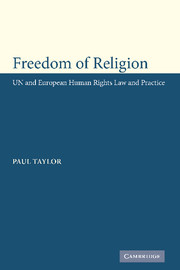Book contents
- Frontmatter
- Contents
- Foreword by David Harris
- Preface
- Table of cases, applications, and communications
- Table of treaties, declarations, and other international instruments
- List of abbreviations
- 1 Introduction
- 2 Freedom of religious choice
- 3 The scope of the forum internum beyond religious choice
- 4 The right to manifest religious belief and applicable limitations
- 5 Conclusion
- Annexes
- Bibliography
- Index
5 - Conclusion
Published online by Cambridge University Press: 14 January 2010
- Frontmatter
- Contents
- Foreword by David Harris
- Preface
- Table of cases, applications, and communications
- Table of treaties, declarations, and other international instruments
- List of abbreviations
- 1 Introduction
- 2 Freedom of religious choice
- 3 The scope of the forum internum beyond religious choice
- 4 The right to manifest religious belief and applicable limitations
- 5 Conclusion
- Annexes
- Bibliography
- Index
Summary
The myth surrounding the nature of coercion to change religion or belief
This work began by considering freedom of choice in religion and the intention behind those provisions which offer protection against coercion that would impair that freedom of choice. The discussion touched upon an issue which, perhaps more than any other, bears out the conspicuous disparity between Universal and European practice – the strictness of standards maintained by the Human Rights Committee and the Special Rapporteur over decades contrasts with the accommodating approach of the Strasbourg institutions in supporting State restrictions on critical aspects of the freedom of thought, conscience and religion. This has so far only partially been corrected in important recent decisions.
In spite of opposition from numerous States to an explicit right to change religion, which even threatened the existence of the Declaration on the Elimination of all Forms of Intolerance and of Discrimination Based on Religion or Belief (‘the 1981 Declaration’) at a crucial stage of its drafting, the Human Rights Committee has constantly interpreted Article 18 of the International Covenant on Civil and Political Rights (‘ICCPR’) so as to embrace fully the right freely to change or to maintain religion at will. The Human Rights Committee's position has most clearly been stated in General Comment No. 22, fully conscious of the weight of opposition to that interpretation from States expressed as early as 1947 in the drafting of the Universal Declaration on Human Rights (‘Universal Declaration’), repeated again in the drafting of the ICCPR and reiterated, arguably with greater effect, in the preparation of the 1981 Declaration.
- Type
- Chapter
- Information
- Freedom of ReligionUN and European Human Rights Law and Practice, pp. 339 - 351Publisher: Cambridge University PressPrint publication year: 2005



